FILM REVIEW
‘Connecting the Dots’: A film about the mental health of young people and the power of vulnerability
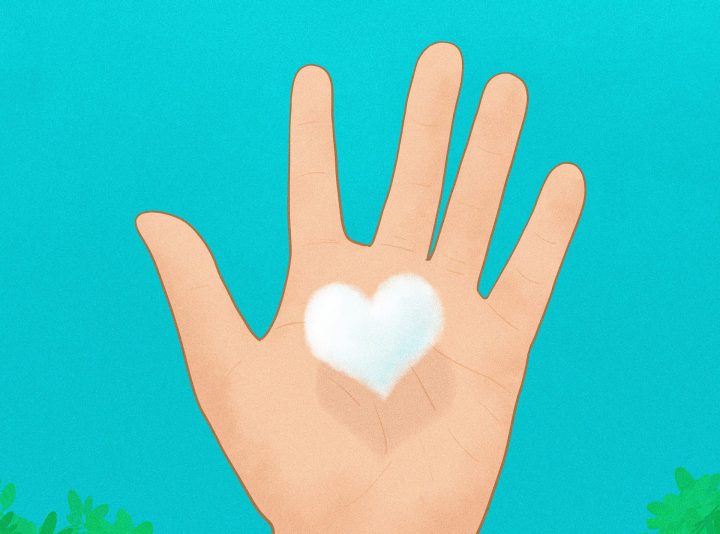
A new documentary, ‘Connecting the Dots’, depicts the crisis of mental health faced by young people today. It is a gripping, heart-wrenching watch, and its message is dearly needed in South Africa.
In 2021, Daily Maverick wrote that “Covid-19 has exacerbated the mental health pressures of young people”, and while the lasting effects of the pandemic must be dealt with, it is also important to recognise that young people had been struggling long before the coronavirus.
In the same year, the World Health Organization reported that more than 700,000 people die due to suicide every year around the world, and that for every suicide there are 20 suicide attempts.
Globally, suicide is the fourth-leading cause of death among 15- to 19-year-olds, and according to data from the Western Cape government, 9% of all teenage deaths are due to suicide – and the numbers are increasing.
Something needs to be done.
Connecting the Dots follows international speaker Nathan Harmon as he travels to schools across the world, meeting young people and sharing their stories.
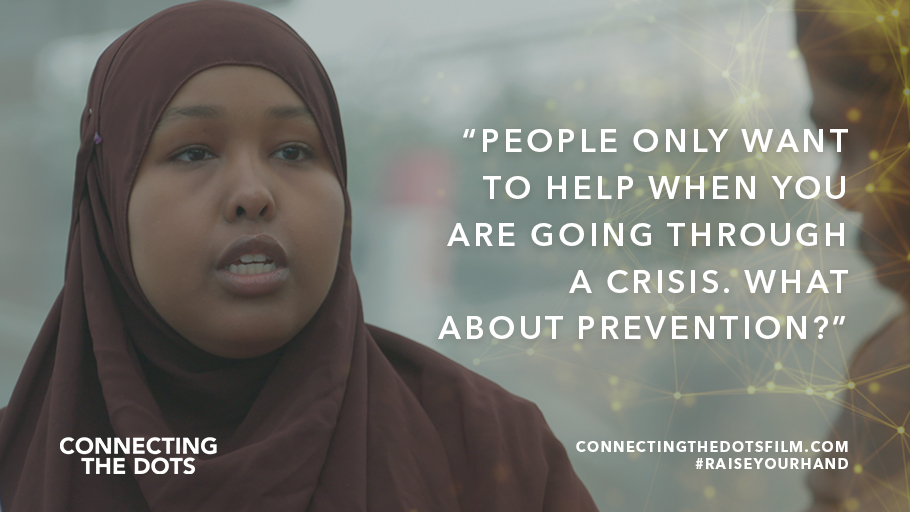
“People only want to help when you are going through a crisis. What about prevention?.” Image: “Connecting the Dots” film / Supplied
Standing in front of an assembly of students, he asks them if anyone they know has struggled with thoughts of ending their own life. The whole room lifts their hands. He then asks if any of them have themselves thought of suicide.
Hands are high up in the air. Hearts in throats, you could hear a pin drop.
Directed by writer, director and filmmaker Noemi Weis, this is a visually stunning work, with sweeping shots of the landscapes Harmon travels. And yet, there is a deep sadness that permeates throughout as Harmon invites his audience to reflect on the realities of mental health in teenage communities today.
As Connecting the Dots takes the audience on a journey across so many spaces and communities, connecting them to different voices and stories, the whole film is wrapped up in the understanding of what young people of today need.
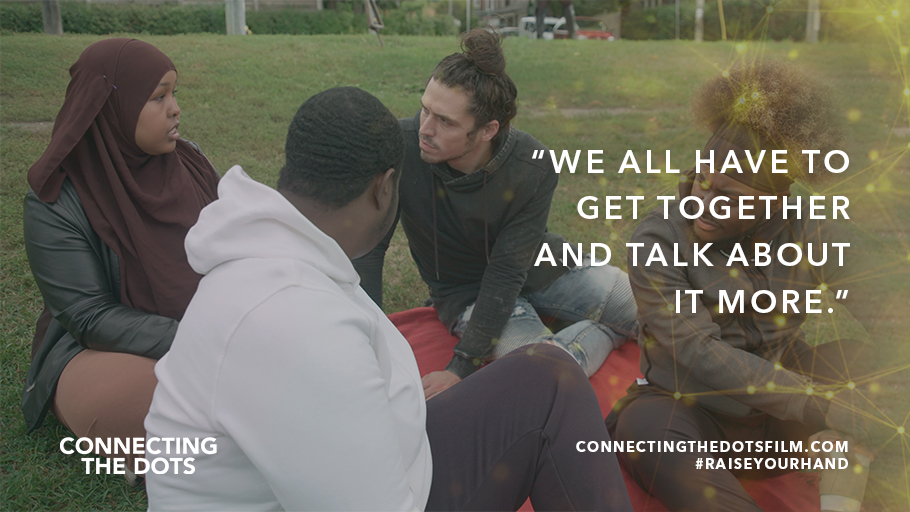
“We all have to get together and talk about it more.” Image: “Connecting the Dots” film / Supplied
While Harmon is a riveting speaker, he is also a good listener. He is passionate and vibrant and his heart for teenagers and mental health is tangible, but he also brings a softness that seems to draw the people he meets to share.
“I think that there is a commonality among young people who feel they are not being heard, not validated, feeling that the system is not supporting them, and feeling that they need to be part of the conversation,” Weis says.
“One of the big things that we bring forward with the film is, let’s not talk about them without them. Let’s talk about them with them and let them be part of the conversation because it is obvious that society has built a global system that does not appeal to them, that this is not how their future should look.”
It is thus the young people interviewed who truly have a voice in this film as they share their own struggles and hurts.
The film is a global endeavour, moving from community to community and country to country. The reality is that teenagers across the world are struggling. “There’s been young people from Australia, from Africa, Europe, Latin America and North America, and they have all expressed the same issue,” Weis says.
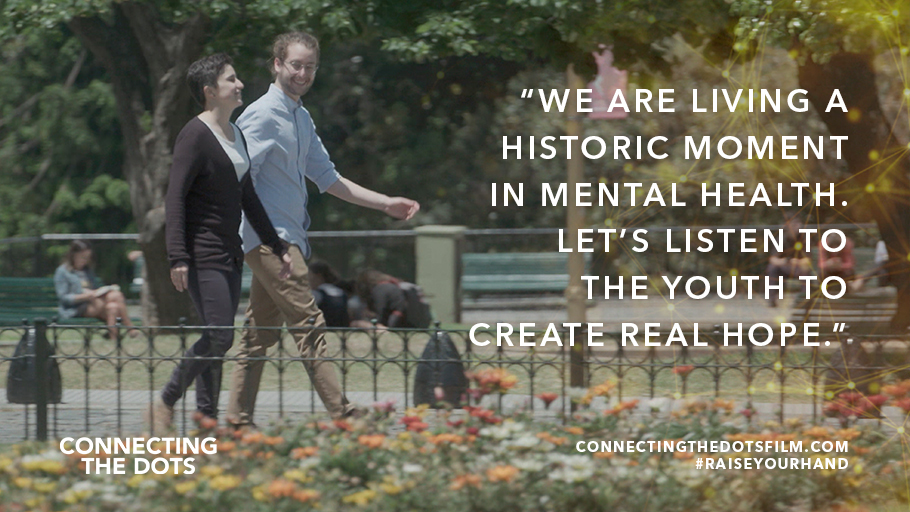
“We are living a historic moment in mental health. Let’s listen to the youth to create real hope.” Image: “Connecting the Dots” film / Supplied
Depression, anxiety, mental illness and deteriorating mental health do not discriminate, they are not limited by borders. Everyone is struggling, young people need help.
Connecting the Dots does not paint all communities with the same brush, though. It is keenly aware that different spaces experience different things, and that the realities students live in differ from place to place. Instead, it focuses on individuals’ feelings, and explores how different communities are addressing mental health in a way that works for them.
Interspersed throughout the film there are short snippets from teenagers around the world. Weis calls them “visual diaries”, portrait videos (that remind one almost of TikTok or Instagram stories) of teenagers who candidly speak about their personal experiences with mental health.
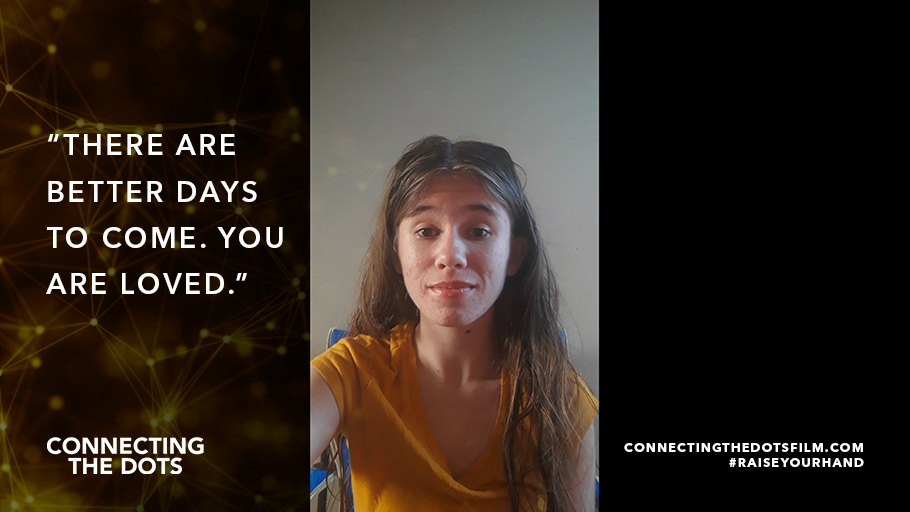
“There are better days to come. You are loved.” Image: “Connecting the Dots” film / Supplied
They are unedited and raw, ranging from good days to bad days, taken in bedrooms and cars across countries. There is a vulnerability and connection to the audience as they speak freely and open their hearts to the camera. There were no rules, Weis says, everything was valid.
“Young people felt that by sharing their stories, they could help other people in the process. The interesting part was that through the process of filmmaking I was able to see some healing, just by the fact that someone was listening to them. That was very rewarding. If I am able to help one person, then I’ll take the film out to the world,” she says.
They have started the conversation, and it is now up to us to carry it on.
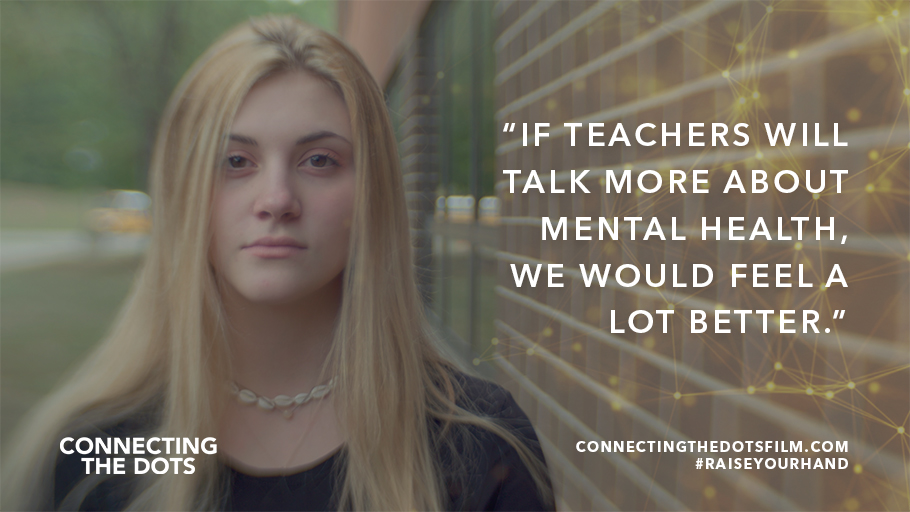
“If teachers will talk more about mental health, we would feel a lot better”. Image: “Connecting the Dots” film / Supplied
For Rachelle Best, the founder of FYI Play it Safe and who organised for the film to be screened in South Africa, the film is a wake-up call for parents and teachers to create safe spaces for children to share.
“We’ve spoken about mental health in a way that is almost distant from us, at arm’s length. I want this film to bring home the concept that we can be the change and talk about mental health with our children,” she says. DM/ML
Connecting the Dots will be screened at The Labia Theatre in Cape Town on 22 February 2022 at 10am and 6pm. Tickets cost R120 per person and are available through Webtickets. The film is recommended for an audience of 12 years and older.
Groups, schools and organisations can book a bespoke screening of Connecting the Dots virtually or at their own venues. Contact [email protected] for further information.
If you’re struggling with severe anxiety, depression and suicidal ideation, the South African Depression and Anxiety Group has a 24-hour helpline: 0800 456 789.


















 Become an Insider
Become an Insider
Comments - Please login in order to comment.